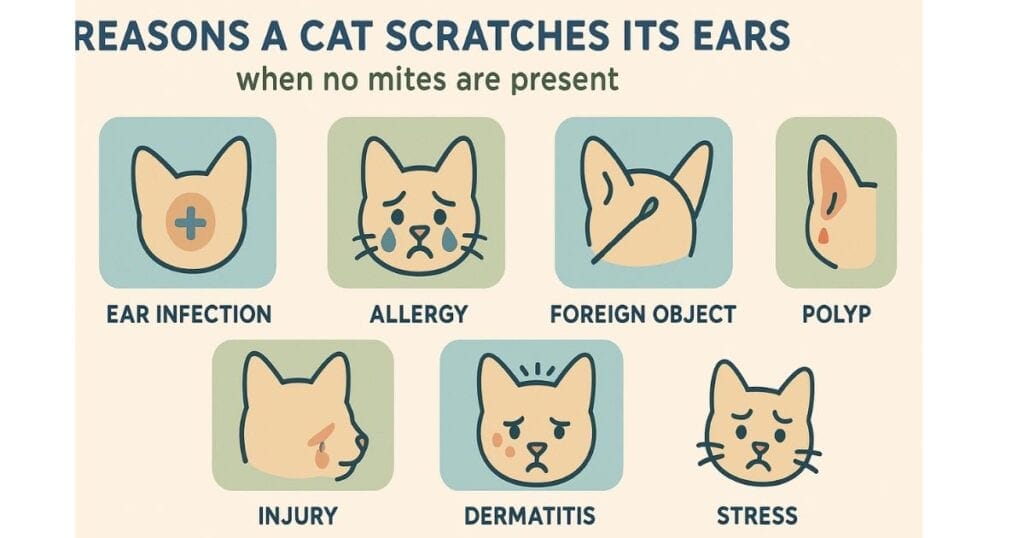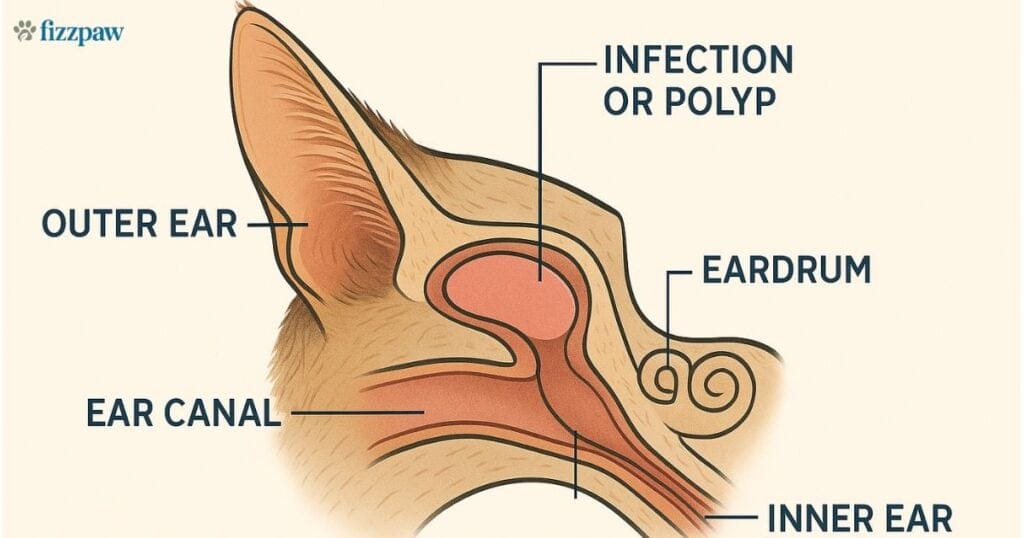Cats love to scratch; however, it can be frustrating to see your cat scratching ears continuously, particularly when a veterinarian says there aren’t any mites. It’s possible that mites could be the cause that’s rarely the case.
Cats may scratch because of allergies or the ear foreign objects or even stress. The identification of the cause is vital for a successful treatment and relief. If left untreated, continual scratching may cause ear damage as well as secondary infections. This article reveals the true causes of itchy ears in cats in cases where mites aren’t at the root of the problem. Learn more about what’s making your cat uncomfortable and what you can do to help your cat feel better quickly.
Why Is My Cat Scratching Ears Without Mites?

If your cat is scratching at its ears, it’s only natural to think that it’s ear mites that are responsible. But, there are many other underlying conditions that may cause your cat’s ears to scratch even without the presence of ear mites. Allergies, ear infections or physical traumas can result in scratching the ears of cats.
If animals scratch their ears, they generally do it to ease irritation. It’s crucial to find the root cause so that you can take appropriate action. If your cat scratches but you aren’t seeing any evidence of the presence of mites or black gunk within the ears of cat, you need to consider other options. Knowing the signs of cat ear issues can help you identify the cause and what you can do to fix the issue effectively.
1. Ear Infections (Bacterial or Fungal)

One of the top reasons behind cat scratching ears is ear infections caused by bacteria or fungus.They can be caused by fungal or bacterial in the nature. Cat ear infections can develop when bacteria or fungi enter the ear canal, often due to dirt buildup, excess moisture, or allergies.
Symptoms of Ear Infections in Cats
- Redness and swelling inside the ear canal
- Discharge from the ear, often yellow or brown
- The cat shaking head, but no mites
- Cat ear trauma from scratching
- Excessive earwax or cat ear crusting and hair loss
If not treated If left untreated, cat ear infections may cause more serious problems like an infection of the inner ear in cats, or the inflammation of the ear in felines. It’s crucial to treat ear infections promptly to avoid long-term ear infections and other severe conditions. According to AVMA, treating ear infections in the early stages can help prevent the development of more serious complications.”
Fungal vs. Bacterial Ear Infections
| Type of Infection | Symptoms | Treatment |
| Fungal Infection | Yeasty odor, dark discharge, itchy ears | Antifungal ear drops or ointments |
| Bacterial Infection | Thick, yellowish discharge, foul smell | Antibiotics prescribed by the vet |
2. Allergies (Food or Environmental)
Allergies are another major cause of cat scratching ears, often overlooked by owners. Ear allergies in cats are usually caused by environmental or food triggers. Food allergies can trigger irritation and itching that could lead to persistent scratching of the ear in cats. Common food allergens are dairy, grains, and certain proteins.
Environmental triggers can also cause allergies. According to a study conducted by the American College of Veterinary Dermatology (ACVD), pollen and dust mites are commonly triggers.” Dust mites, pollen or mold are all common causes. If your cat’s immune system is overreacting to allergens like dust mites or mold and trigger symptoms such as itchy ears, swelling of the ear or the appearance of redness. The irritation can lead to scratching, which could result in further damage to the ear and discomfort.
Signs of Allergies in Cats
- Itchy cat ears
- Cat head tilt ear infection
- Cat shaking head but no mites
- Redness around the ears
- Cat scabs on the ears
3. Foreign Objects in the Ear
Sometimes foreign objects, such as dirt, grass, and tiny pieces of debris, may get caught inside your cat’s ear. This could cause irritation and even scratching of the ear in cats. If your cat was outdoors or in areas that have many particles or dust, or dirt, they could find something stuck inside their ear, without not even noticing.
Symptoms of Foreign Objects in the Ear
- Ear scratching in cats
- Head shaking
- Visible discomfort when touching the ear
- Cat ear trauma from attempts to dislodge the object
If you find a foreign object stuck in your cat’s ear, it could cause an inflammation or infection. It is recommended to clean the ear with care or visit the vet to remove it.
4. Skin Conditions Like Dermatitis or Mange
Dermatitis and other skin conditions like it or mange, can trigger ear irritation in cats. Dermatitis is a condition that causes irritation of the skin which can be caused by infections, allergies, or parasites. Mange, which is caused by mites can cause itching and ear discomfort.
These conditions are often associated with other symptoms, like the loss of hair around the ears, swelling or redness on the skin. If not treated, they can lead to persistent itchy cat ears or harm the ears.
Symptoms of Dermatitis or Mange
- Itchy ears and scratching
- Cat ear crusting and hair loss
- Cat scabs on the ears
- Redness around the ears
- Cat shaking head but no mites
5. Ear Polyps or Growths
Ear polyps and other kinds of growths may form within the ear canal of your cat. These growths could impair the ear canal and cause discomfort. This can lead to ear itchiness. Ear polyps tend to be harmless, but they may nevertheless cause severe irritation and may even cause infection if they are not treated.
Signs of Ear Polyps in Cats
- Ear scratching in cats
- Cat ear discharge that may have a foul odor
- Difficulty hearing or head tilt
- Chronic ear issues in felines
If you experience any of these signs then it is important to visit your veterinarian. The diagnosis of cat ear infections or polyps is a comprehensive examination. This could include hearing examinations and cleaning.
6. Injury or Trauma to the Ear
Abrasions to the ear like bites, scratches, or even trauma, could cause discomfort and even scratching. Cats can injure their ears when playing or fighting with a cat. Even a small injury could cause discomfort and can cause cat ear injuries and scratching at the ears.
If your cat appears to be shaking or scratching their head after sustaining an injury this may be an indication that the ear is affected. It is essential to treat the problem promptly to avoid further infections and damage. According to the veterinary experts at Cornell University, the earlier intervention is crucial in preventing chronic ear problems in cats.”
Symptoms of Ear Trauma
- Redness or swelling in the ear
- Visible cuts or scratches on the ear
- Bleeding or fluid discharge
- The cat is shaking its head, but no mites
7. Anxiety or Stress-Related Grooming
Sometimes, excessive ear scratching may be related to stressed or anxious cats. If cats are stressed, they might start grooming their ears in a way that is excessive way, including scratches on their ear. The most common reasons for stress in cats are changes in their surroundings and pets, new people or animals or loud sounds.
Signs of Stress-Related Scratching
- Increased grooming in general
- Scratching ears after mite treatment
- Aggression or changes in behavior
- Excessive earwax cat
If your cat’s ears are scratching because of stress, you might have to tackle the root causes of the stress. Making sure your home is calm and using products to reduce stress could assist.
When to See the Vet
If the scratching of your cat’s ears persists or becomes worse even after you try, you should consult with a vet. Finding out if your cat has problems with ear canals or other issues can be difficult without assistance from a professional. A veterinary examination for ear problems in cats is necessary to pinpoint the cause and to begin treatment.
When to Visit the Vet
- Chronic cat scratching ears should never be ignored, especially if symptoms persist for more than a few days.
- If you notice cat ear discharge or black gunk in cat ears
- If your cat shows signs of pain or head tilting
- If the scratching leads to cat ear trauma
Home Care Tips to Soothe Your Cat’s Ears
While you wait for a vet appointment. There are some ways you can take at home to ease your cat’s ears that are irritated ears. Ear cleaning that is safe for cats is among the most effective methods to treat the discomfort of the ear canals. Utilize a gentle approved by a vet for ear cleaning to eliminate debris or wax buildup. “As a doctor. Jane Smith, a certified veterinarian, points out”Using a gentle approved ear cleanser by a vet is crucial to reduce the risk of irritation for cats suffering from chronic ear scratching.’
Home Remedies for Cat Ear Itching
- Use olive oil or coconut oil to help soothe the ears (only if no infection is present).
- Gently clean the ears with a vet-recommended ear cleaner.
- Keep the ears dry and avoid getting water in them.
- Reduce your cat’s stress by providing a peaceful environment.
Final Thoughts: Don’t Ignore Persistent Cat Scratching Ears
If your cat continues with cat scratching ears even after treatment for mites, it’s crucial to treat the problem seriously. A cat’s ear scratching can be an indication of an underlying issue that requires medical treatment. If you know the reason, it is possible to assist your cat to find relief and avoid the development of further problems.
Related Reading:
👉 How Can I Soothe My Cat’s Itchy Skin – Complete Guide
FAQs
How can I relieve my cat’s itchy ears?
Clean them gently with a vet-approved solution and treat the underlying cause like allergies or infection.
Why does my cat scratch his ears?
It could be caused by allergies or infections, foreign objects or irritants, even if there are there aren’t any mites.
How can I tell if my cat has ear mites?
Find the presence of dark, crumbly, and dark wax (like coffee grounds) and frequent head shakes, and sharp scratching.
How do you treat a scratch on a cat’s ear?
Clean it up with an antiseptic solution that is diluted and watch for any signs of infection. Consult your vet if the condition gets worse or larger.
Can I put vaseline on my cat’s itchy ears?
No—Vaseline isn’t safe for cat ears and may trap bacteria; always use vet-recommended products.




